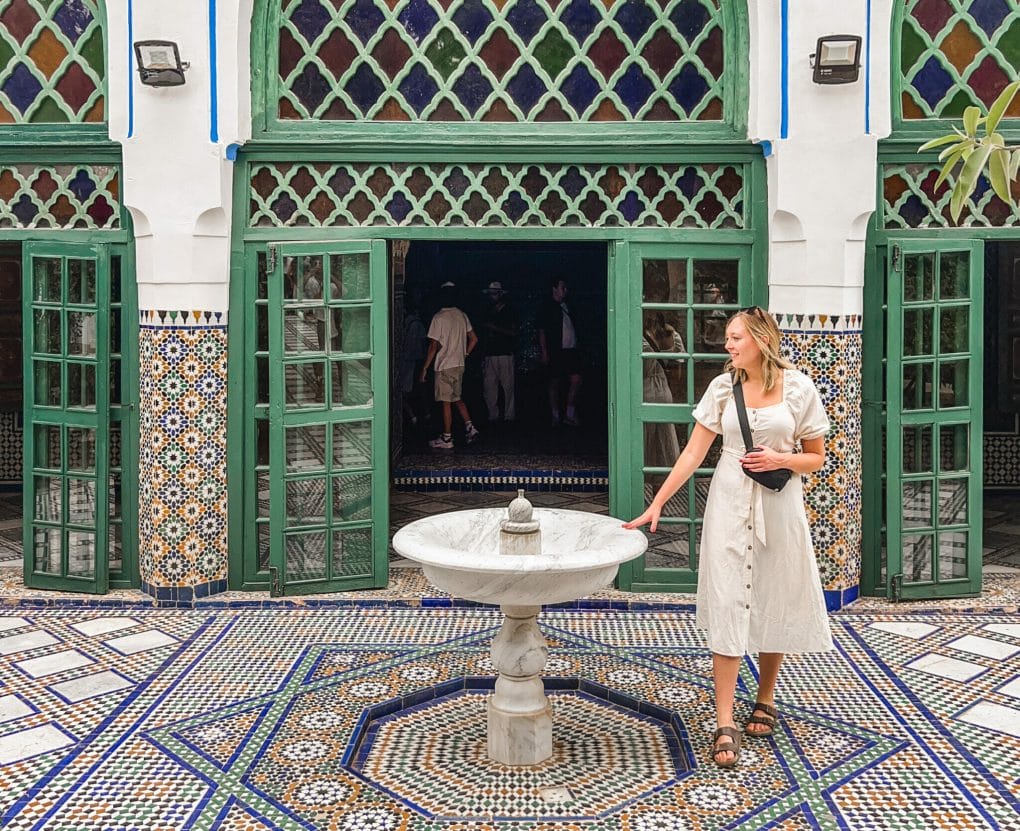Before you make your way to Northern Africa, here are some essential travel tips for Morocco that’ll ensure you have a safe and smooth adventure.
I don’t know about you, but I hate showing up to a new country completely unprepared. I like to know what to expect in terms of culture, language, manners, and more. It not only helps me feel more at ease (travel anxiety is real, y’all), but it allows me to navigate a new place like a pro.
First and foremost, Morocco is known for its enchanting blend of ancient traditions comprised of bustling medinas, eye-catching mosques, and colorful souks (marketplaces) where locals sell beautiful handicrafts and goods.
Outside of the city, diverse landscapes, from the Sahara Desert’s sweeping dunes to the Atlas Mountains’ rugged beauty, offer a captivating backdrop for adventure seekers and cultural enthusiasts alike.
Not to mention, Moroccan hospitality is off the charts, and the people are friendly and always ready to welcome you with a nice hot cup of mint tea.
But there are some minor details that I think it’s worthwhile to share with others planning an exciting trip to Morocco. This list dives deep into the essential Morocco tips every traveler should know.
This post may contain affiliate links, meaning at no additional cost to you, if you click my links and make a purchase, I may earn a small commission. Learn more on my disclosure page. Thank you for your support!
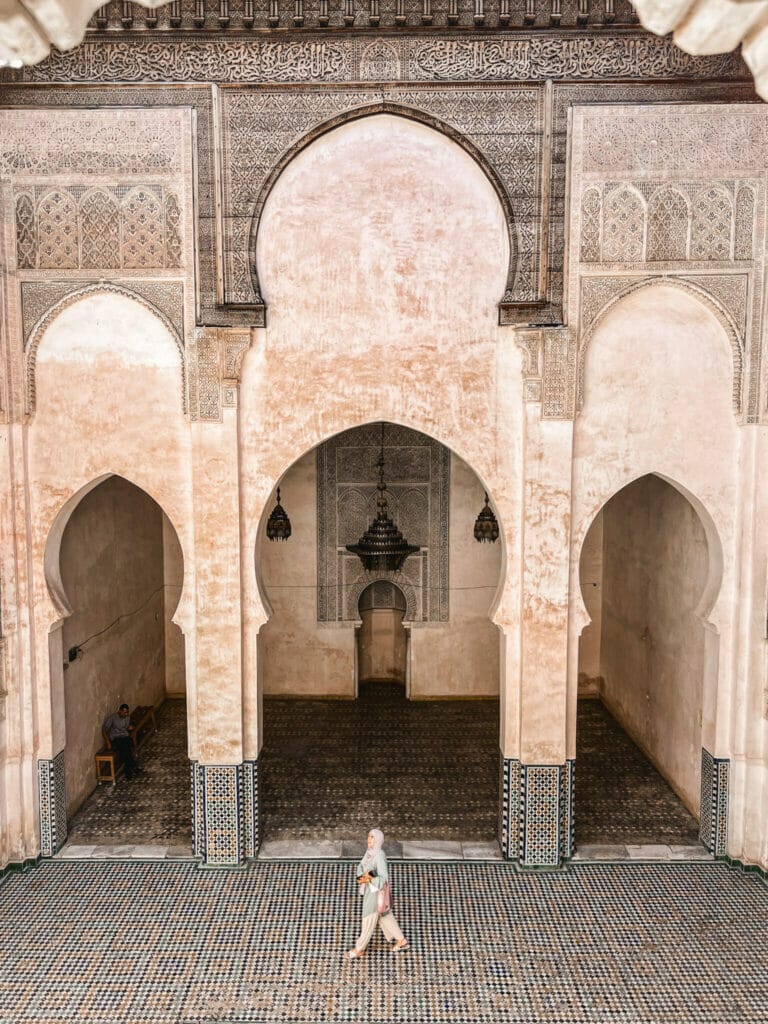
Travel in Morocco at a Glance
- Currency: Moroccan Dirhams (MAD)
- Language: Berber, Arabic
- Outlet plug: Type C&E, two-round prongs (Europe)
- Tap water: Not recommended to drink
Sept 2023 Morocco Earthquake Travel Warning
If you have an upcoming trip to Morocco or are planning on visiting in the near future, please be aware that the country was hit by a severe 6.8 earthquake, causing mass damage and casualties of more than 2,800 people.
This tragedy has resulted in the loss of immense human life and the destruction of historical landmarks centered around the Atlas Mountains and Marrakech. Travel has been affected by this natural disaster.
Please be respectful during this time and be sure to look into your travel plans to see if they’re affected and consider helping where you can.
I’ve heard the communities rely heavily on tourism, so while it’s probably not necessary to change your plans, just note that attractions may be closed or unavailable.

25 Need to Know Travel Tips for Morocco
1. Best Places to Visit in Morocco
If you’re in the beginning phases of planning your Morocco itinerary, here are some of the best places to visit at a glance:
- Tangier: A large city in the north along the water across from Spain
- Chefchaouen: The famous and beautiful blue city that attracts visitors itching to enjoy its small town charm.
- Marrakech: A former imperial city and one of the country’s largest and most popular destinations for visitors
- Casablanca: The country’s largest city home to the only mosque tourists are allowed to enter
- Essaouira: A charming coastal small town located three hours from Marrakech
- Erg Chebbi, Sahara Desert: A large expanse of wind-blown sand dunes that are home to various luxurious desert camps
- Ben Ait Haddou: A historic and mostly abandoned fortified village that is a UNESCO World Heritage site and the filming site of Gladiator and Game of Thrones.
- Dades Valley: A beautiful stretch of the country home to the road of a thousand kasbahs, stunning gorges, etc.
- Ouzoud Waterfall: A 330 feet tall series of cascades surrounded by lush greenery 2.5 hours from Marrakech
- Atlas Mountains: A region known for traditional Berber villages and exciting multi-day treks
»Read more: Marrakech Bucket List: 15 Unique Things to Do in Morocco’s Red City
2. How Much Time Do You Need in Morocco?
How much time you need in Morocco obviously depends heavily on what you want to see, but generally, I recommend at least a week. Many of the country’s top destinations are spread apart by semi-long drives.
Especially for those who wish to experience the bright orange sands of the Sahara Desert, which is about a 9+ hour drive from Marrakech.
We had about 11 days in Morocco and felt it worked out to be an excellent amount of time. We flew into Tangier and made the famous loop to Chefchaouen, Fez, the Sahara, the Dades Valley, and stops in between before flying out of Marrakech.
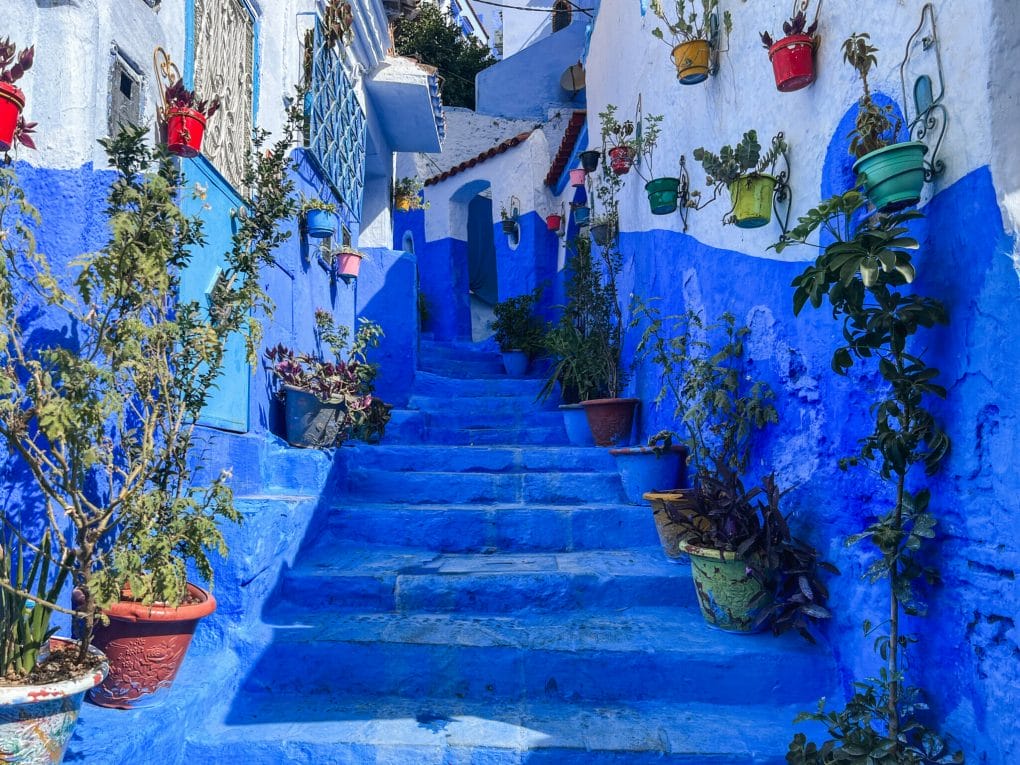
3. Morocco Travel Visa
Before traveling to any country, it’s essential to check out what visa requirements apply to you based on your nationality.
You can learn more about the Morocco tourist visa on their official consulate website. However, many people are eligible for Morocco’s visa on arrival and do not need to apply for one before arriving.
For example, those with a passport from an E.U. country, the U.K., U.S., Australia, New Zealand, Canada, etc., are exempt from needing a tourist visa. But you do need proof of exit (a return plane ticket) and a passport valid for at least 6 months beyond your set departure date.
4. Best Time to Visit Morocco
The best time to visit Morocco is during fall or spring when the weather is the most pleasant and mild. Mid-March to mid-May and September to October is generally the best time to visit Morocco.
In the summer, temperatures are scorching hot, making wandering around the cities and a trip to the Sahara desert unpleasant.
Come wintertime, the weather becomes rainy, and snow blankets much of the roads that travel through the Atlas Mountains. When the snowfall is heavy, the mountain roads are closed, making cross-country travel to certain destinations impossible.
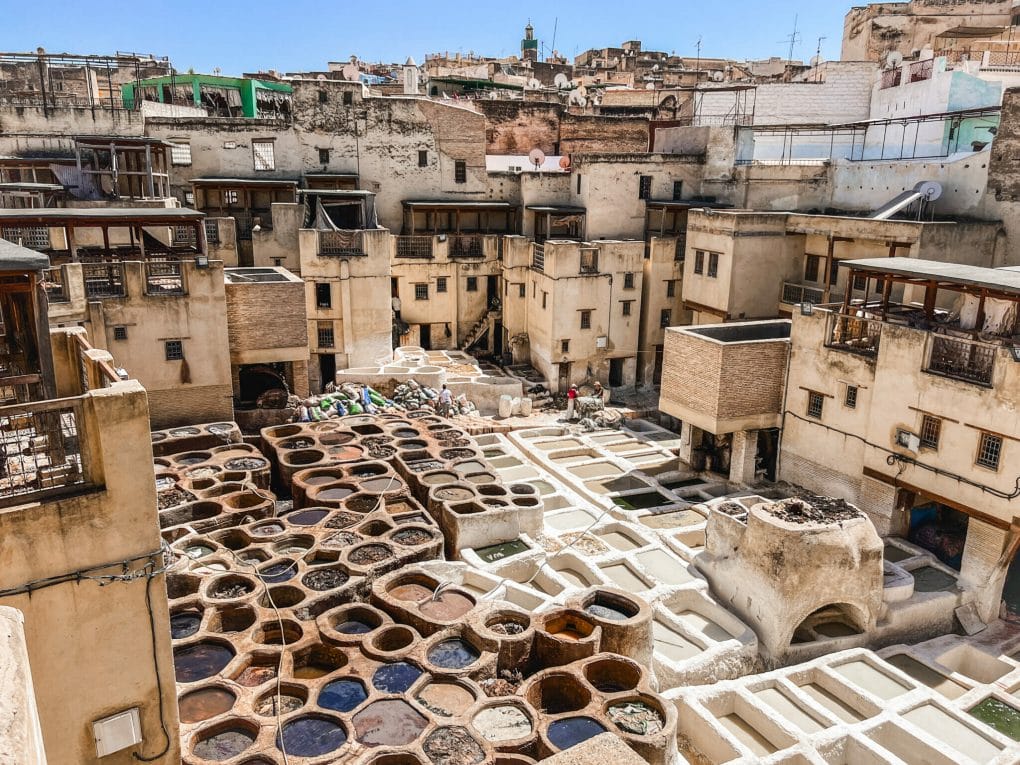
5. Worst Time to Visit Morocco
Outside of the weather, visitors may want to avoid visiting Morocco during important Islamic holidays or at least do some research to see what traveling to Morocco during Ramadan is like, which for some may also offer a unique cultural experience.
As a predominantly Muslim country, hours to businesses and attractions may differ during big events like Ramadan, Eid al-Fitr, and Eid al-Adha.
The dates for these important holidays vary each year as the Islamic calendar is 12 days shorter than the West’s Gregorian calendar. So be sure to do a quick Google search before booking anything!
6. Morocco is Predominantly Muslim
As previously mentioned, Morocco is an Islamic country. This means travelers from the West should take note of some of the key cultural differences found in Morocco and Arab nations in general.
Some big cultural things to be aware of when visiting Morocco are:
- Pork is not traditionally eaten as it’s halal (“forbidden”), so you won’t find it on the menu.
- You’ll hear the Islamic call to prayer at dawn, noon, mid-afternoon, sunset, and evening ringing from the various mosques.
- Many women wear headscarves (hijab) and long robes for modesty.
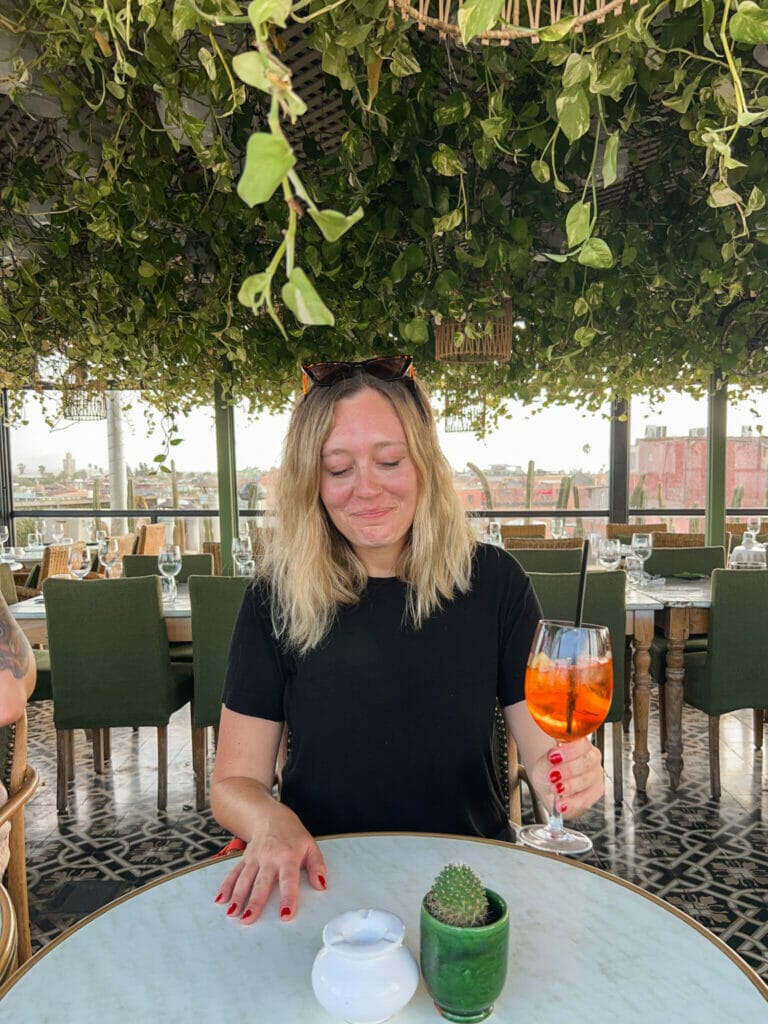
7. Morocco is Largely a Dry Country
As a Muslim country, you won’t find many bars or alcohol for sale. Some places are drier than others, with the hotels and major cities like Marrakech and Tangier being your best bet for finding something to wet your whistle.
However, even when we did find beer or cocktails, we felt they were weaker than what you’d find in other places.
8. What to Wear in Morocco
In Morocco, dressing modestly is recommended, especially in more rural places. Tourists are largely free to wear what they’d like, but if you choose to rock bare shoulders, chest, and knees, you will likely attract some stares.
So while you don’t need to worry too much about what you wear, I do recommend that women cover their shoulders/cleavage and avoid super short shorts or skirts.
Additionally, Morocco is a hot place. I recommend coming with lots of flowing and lightweight clothing made from cotton or linen. That’ll help you stay cool, even in the desert.
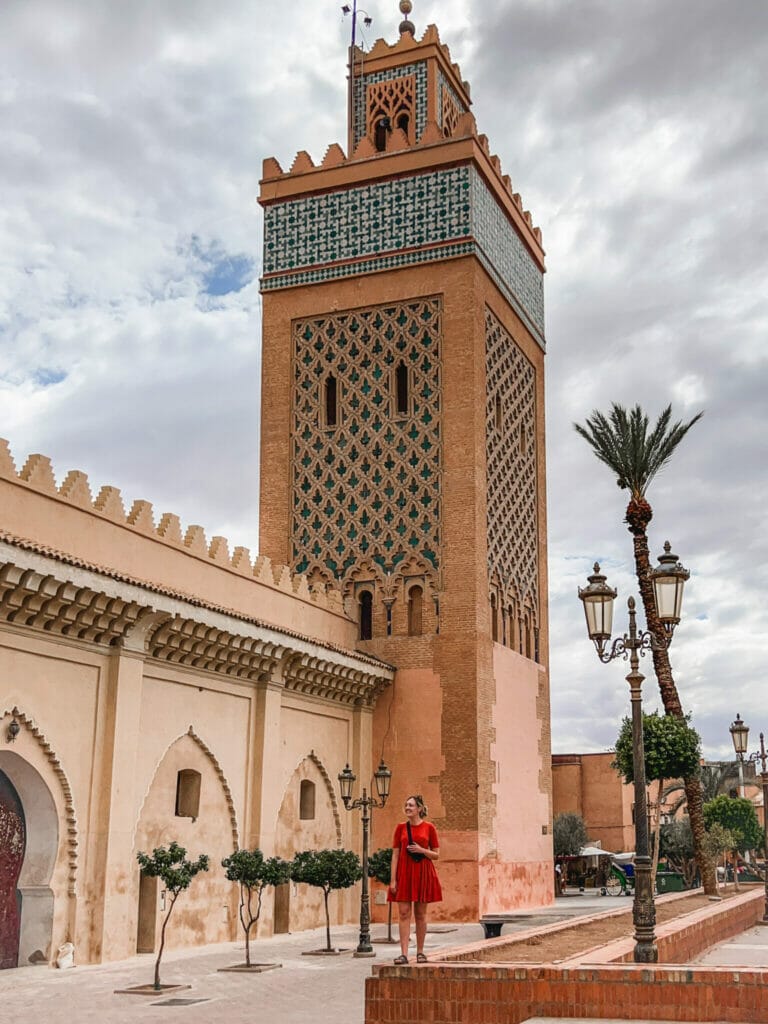
9. If You’re Not Muslim, You Can’t Enter Any Mosques (Except in Casablanca)
Although cathedrals, temples, and holy buildings are often a tourist attraction in other countries, you are not allowed to enter any mosques in Morocco if you’re not a Muslim.
The only exception that tourists can enter is the Hassan II Mosque in Casablanca. This mosque is the largest in Africa and noted for its opulent architecture and 210m / 688 ft tall minaret.
10. Tipping Culture in Morocco
Unlike the U.S., tipping isn’t strictly mandatory in Morocco, but it is expected. The best practice for tipping in Morocco is rounding up the bill, leaving 5-10dr at cafes and about 10% at nicer restaurants.
For any other service you receive, like from tour guides, porters, masseurs, etc., I do recommend tipping.
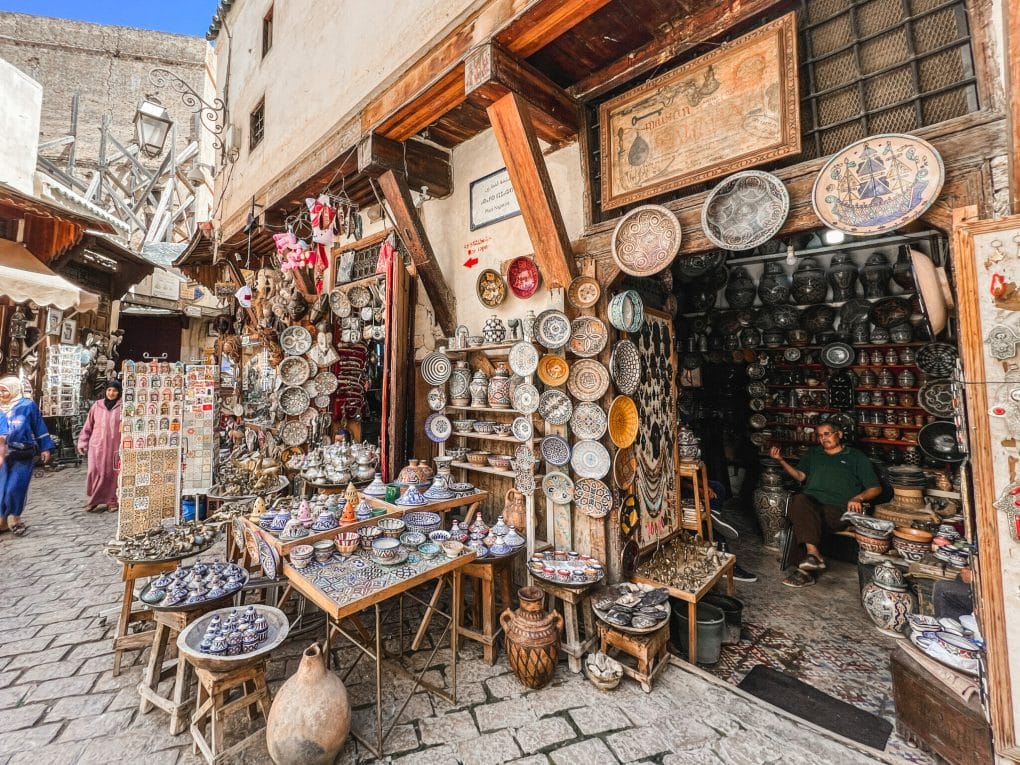
11. Don’t Be Afraid to Haggle
The art of haggling is alive and well in Morocco, and when shopping in markets, don’t be afraid to make an offer. A good place to start is by offering half of the stated price and working your way to an agreed-upon price.
However, it’s not expected to haggle everywhere. Traditional stores, groceries, and stalls that have a sign stating “set price” are not places to haggle.
12. Watch Out for Scams
Scams are common in many tourist destinations, and Morocco is no exception. Some common scams or money-grabbing tactics to watch out for in Morocco include:
- People giving simple directions and expecting money in return
- Fake tour guides
- Overinflated pricing for goods and services
- Fake goods and services
- Henna women trapping you by painting your arm and offering to “fix it” for money
- Snake charmers or people who want payment for photos
The best way to avoid getting scammed in Morocco is to do your research ahead of time, stay alert, and be confident when telling someone no. I’m also a firm believer in trusting your gut when something feels off.
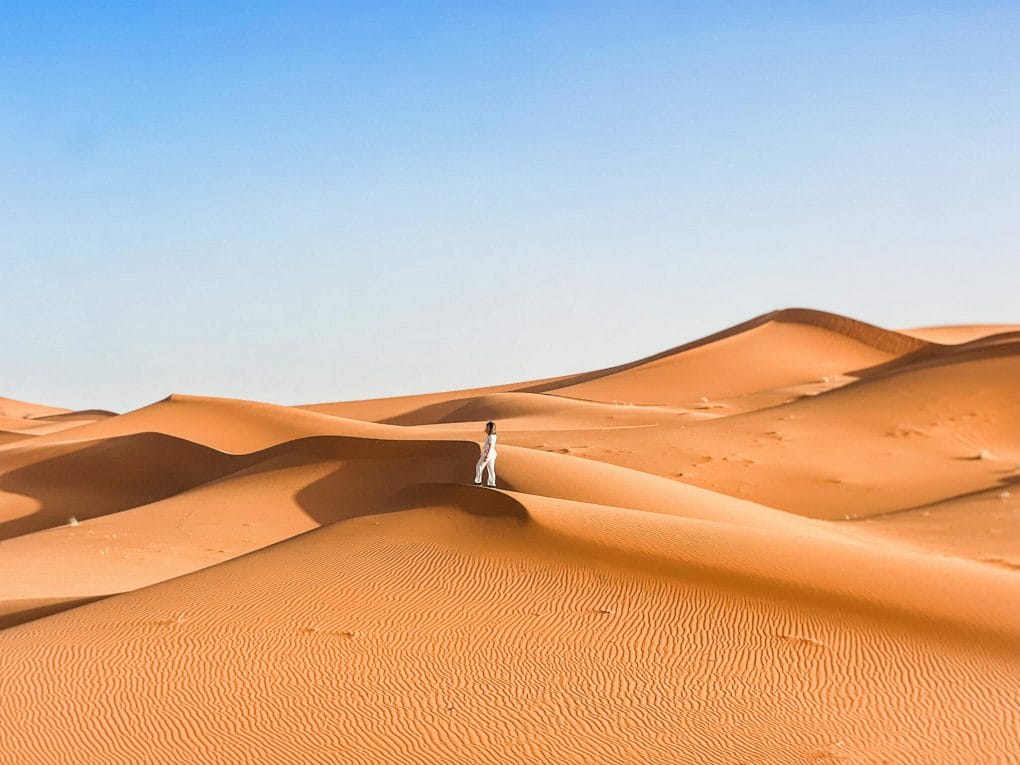
13. Watch Out for Pickpockets and Theft
One thing that makes travel in Morocco extra magical is the country’s historic medinas found in many big cities. However, the narrow and winding streets, lack of lights and cameras, ease of getting lost, and crowds make them a prime place for pickpockets or, worse, outright muggings.
I recommend avoiding dark areas at night and keeping your valuables secure to lessen the risk of potential trouble.
14. Morocco is Largely Cash-Based
Few places in Morocco accept cards, so carrying cash around is essential. I’d say only hotels and modern stores like the mall accept cards.
I also found that many establishments would advertise card payments, but then their card reader wouldn’t be working at the time of payment. I believe it is likely to avoid credit card fees.
Be sure to always have cash on hand, and if you’re in a pinch, many places accept Euros and USD.
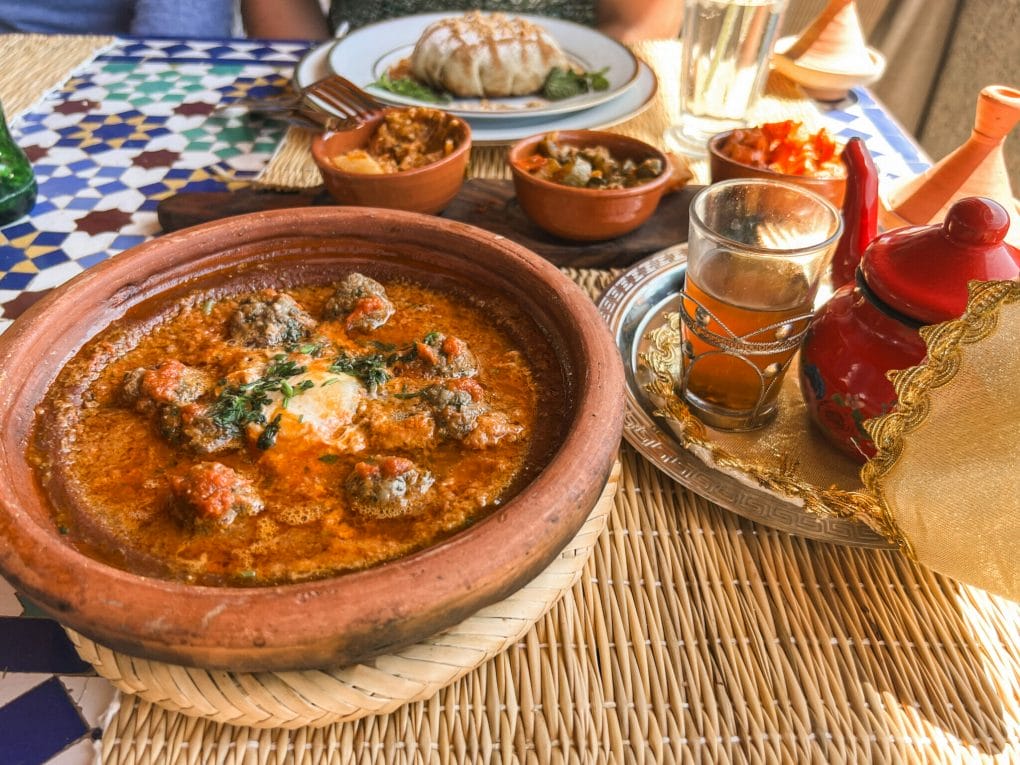
15. Know the Must-Try Moroccan Foods
Eating local foods is one of the best ways to get to know a new place! And looking up the must-try foods or common dishes is a good way to not only ensure you don’t miss anything delicious but that you also arrive with the right expectations of what you’ll be eating during your trip.
Traditional Moroccan dishes center around hearty meats like beef, lamb, and chicken, veggies like peppers, quince, potatoes, zucchini, and eggplant, and other ingredients like couscous and dates.
Some must-try foods in Morocco include:
- Tajine: Meat, veggies, and/or couscous cooked in conical earthenware dish that is super common in Morocco
- Couscous: small grains of pasta often served in heaping portions with meat and veggies
- Dates: A common sweet treat, snack, and ingredient that grows in palm-like date trees all over the country
- Pastilla: A sweet and savory pie filled with meat and veggies and often topped with cinnamon and/or powdered sugar
- Moroccan salads: A variety of cold dishes that range from cold and seasoned eggplant, pickled veggies, seasoned tomatoes, etc.
- Mint tea: a favorite of mine that is served everywhere in Morocco and an integral part of Moroccan hospitality
- Brochettes: kebabs or skewers of meat seasoned beautifully and served with fries or veggies
- Keftas: Moroccan meatballs in a red sauce with an egg, often served in a tagine
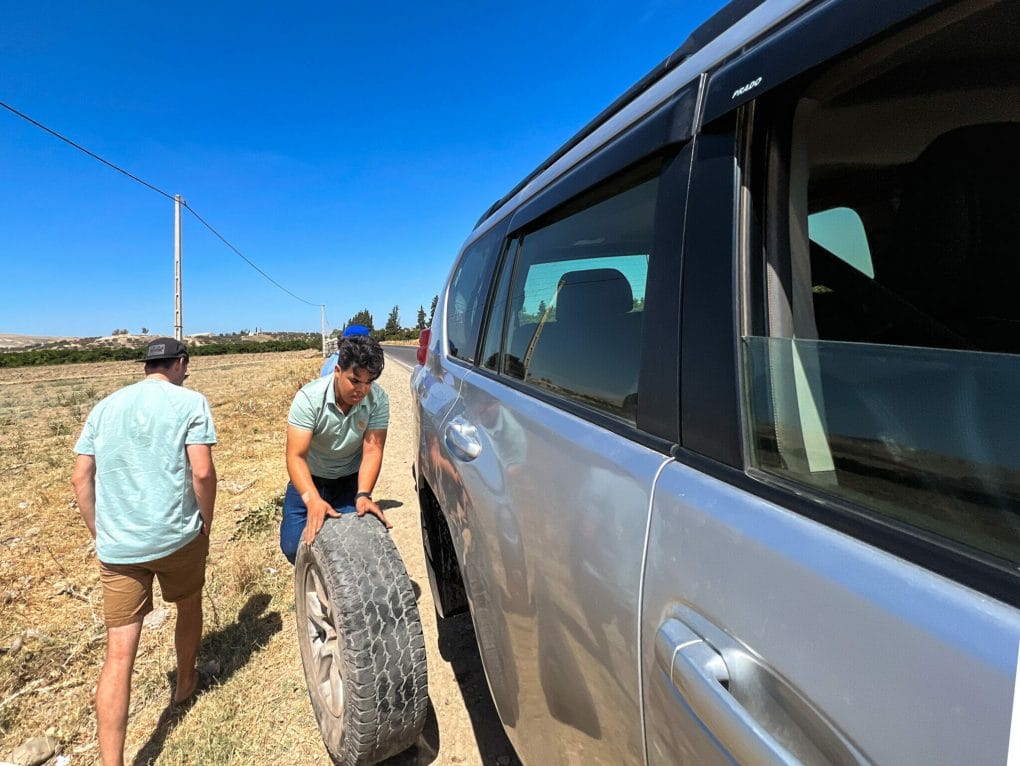
16. Driving in Morocco Isn’t for the Faint of Heart
This is especially true in the big cities where driving rules are more of a suggestion than a hard and fast expectation. Many drivers create their own lanes, try to squeeze to pass in narrow areas, etc.
Outside of the cities, driving in Morocco entails winding mountain roads or countryside highways. One thing to note is that the highways often have what I’d consider slow speed limits (max of 80km usually) and many speed traps and police checkpoints.
Always watch out to follow the speed limit, have your seat belt on, and be prepared to stop if a police officer at these many checkpoints pulls you over. They’ll likely request to see your driver’s license and ask you questions about your plans in Morocco.
17. Google Maps Isn’t the Best in Morocco
Google Maps seemed to work fine outside of the medinas and narrow alleyways, but within the city centers, it wasn’t accurate.
For navigating inside cities like Tangier, Marrakech, and Fes, you may find that Maps.me works better. Not to mention, Maps.me allows for downloaded offline maps for travelers without data.
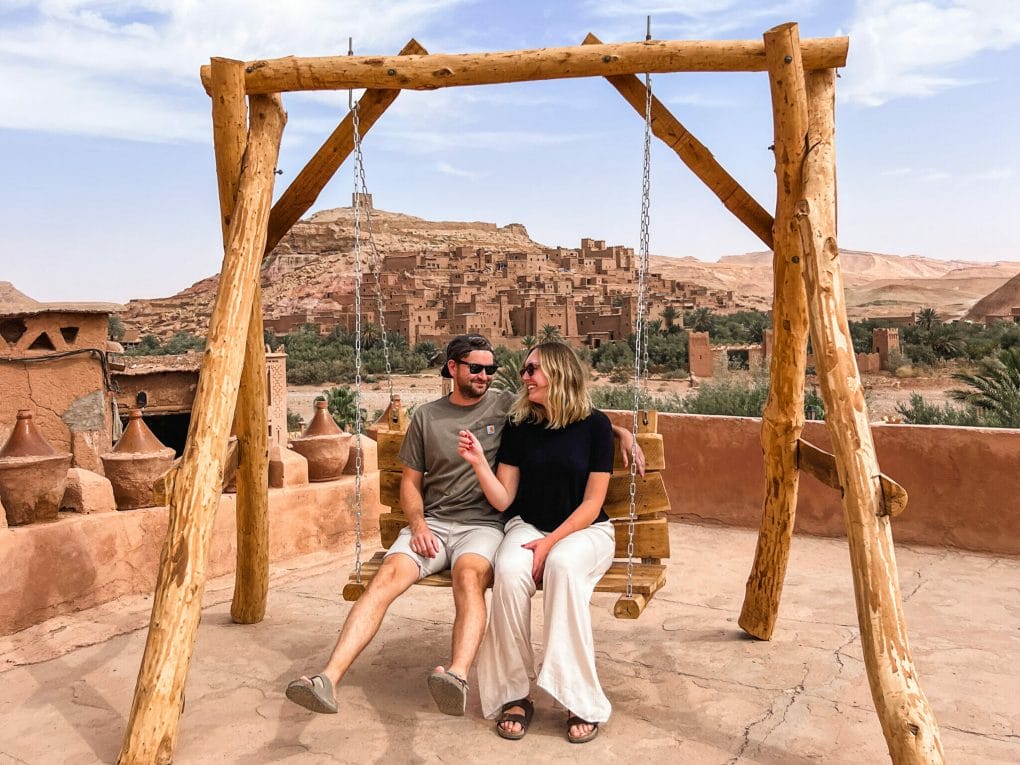
18. Watch the PDA
As a conservative country, it’s essential to follow the cultural norms of Morocco. And one of those norms is to avoid public displays of affection like kissing or groping.
In fact, I made the mistake of forgetting my place and giving my partner a light peck. A seemingly innocent gesture where I’m from, but an act that actually made a passing man upset enough to scold me.
So I’m here to warn others not to make the same mistake I did! For more helpful info, I recommend reading Rough Guide’s etiquette in Morocco.
19. Is Morocco Safe?
In many regards, Morocco is a safe destination, but in others, it is worth pointing out that travelers should take caution.
For one, the U.S. Department of State has issued a level 2 travel advisory: exercise increased caution due to terrorism.
Second, as a Muslim and conservative state, it may not be a safe place for LGBTQIA+ travelers to be open in their gender expression. These travelers should take care and read up on how best to visit Morocco if so desired.
And third, it is not uncommon for female travelers to face verbal harassment or unwanted attention.
I share this not to frighten or deter travelers but to bring to attention the need to be alert and aware of these things. During my 11+ days in Morocco, I didn’t feel unsafe and didn’t run into any issues.
But I do recommend basic safety actions like avoiding walking around at night, especially alone, flashing expensive belongings and/or wearing revealing clothing. Always trust your gut!
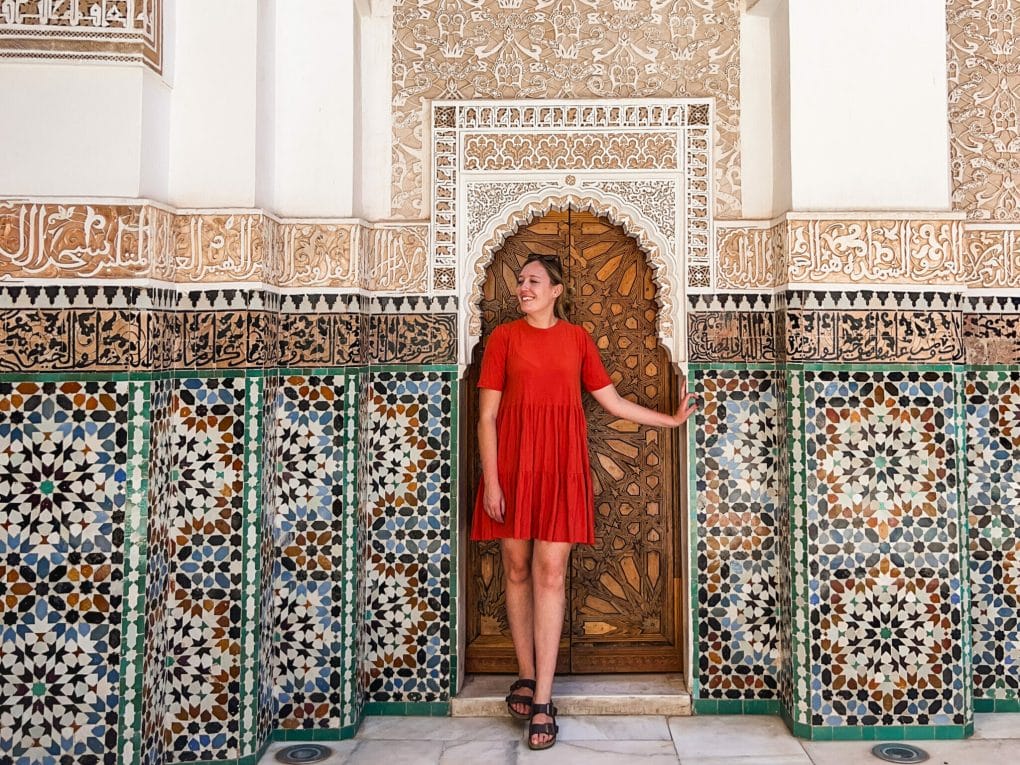
20. Solo Travel in Morocco
I didn’t personally travel solo in Morocco, but I did see and read quite a few experiences from solo travelers who did. I would honestly return one day and be ok visiting Morocco solo from what I saw and experienced.
Plus, I’m a firm believer that 98% of destinations are solo travel friendly, and Morocco is no exception. And ultimately, a place is as safe for solo travel as you feel comfortable as a solo traveler.
However, it doesn’t hurt to read up on helpful tips for solo travel in Morocco.
21. Best Way to Get Around Morocco
Planning how to get around Morocco is a key part of travel planning. The country has two main national train lines that connect major cities from Tangier to Marrakech, primarily following a straight line of travel between the two.
Buses are another option, however, they are slow and not as cost-effective as you would hope for the trade-off in slower travel times.
Ultimately, I’d say the best way to get around Morocco is via car, whether by renting and driving yourself, taking a taxi, or hiring a private driver to take you around. Especially for those planning to travel away from where the prominent train lines run (i.e., to the Atlas Mountains or Sahara Desert).
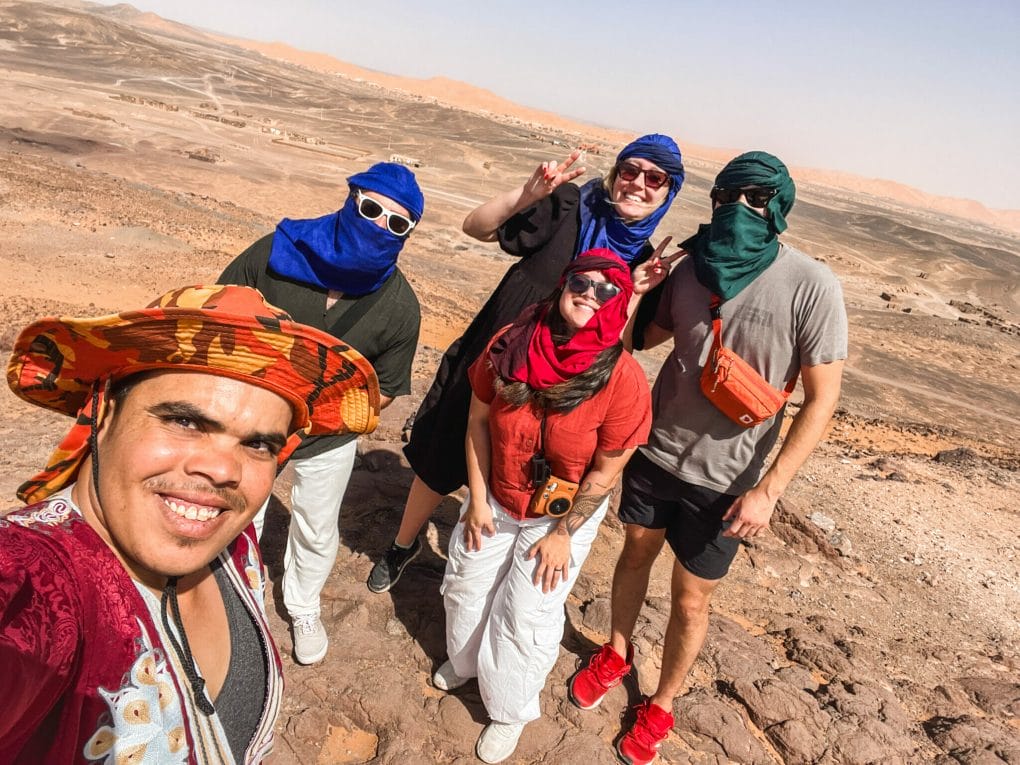
22. Consider Hiring a Tour Guide
I’m not normally one for group or organized travel, but this time, we opted to see Morocco with a tour guide. Traveling as a group of two couples, we went through Morocco Countryside Tours for a number of reasons.
We wanted to travel the country far and wide and decided that a private driver would be the most efficient way for us to do so.
I personally wanted a trip that I could kick back and relax without much planning or effort because, as a travel blogger and type A personality, travel planning is essentially alllllll I think about. And who knows better than a local guide?
Hiring a private guide in Morocco also was much more affordable than you may think and was well worth the price. I highly recommend Morocco Countryside Tours!
23. Airport Security is Intense
When flying out of Morocco, I recommend getting there more than three hours early. I’m not joking when I say the security checks are long, slow, and plentiful.
We flew out of Marrakech and had to wait in line for a security check to get into the departure area, in line for document check/bag drop, another quick security area, passport check, stamp check, and the main security screening.
And the attendants truly did not give a f**k, and I swear they were intentionally slow.
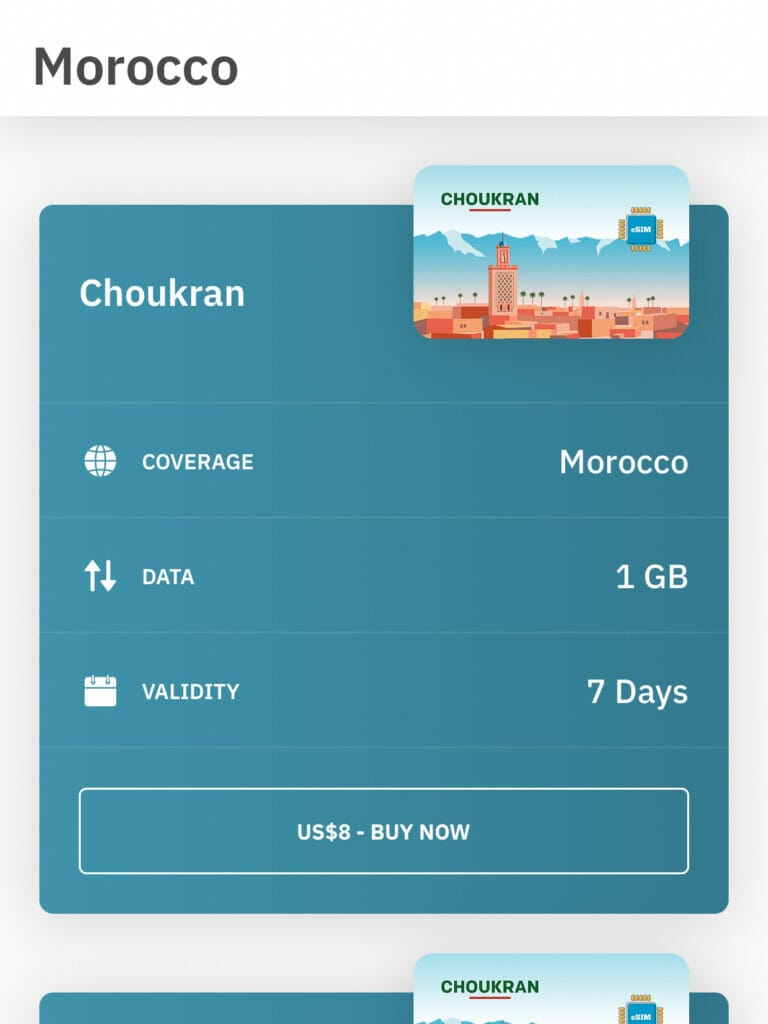
24. Stay Connected with an eSIM Card from Airalo
An eSIM is an easy and convenient way to get data on your phone when you travel without having to register, go to a local phone store, or worry about taking out your primary SIM card.
My go-to is Airalo, which is an app you download on your phone. From the app, you can choose the country you need data for, select the plan you want, and install it immediately over WiFi. And topping up your data is super easy from the app, too.
Some things to note: With Airalo, you won’t get a local phone number but only access to data. But with data, you can make calls over the internet with programs like FaceTime, WhatsApp, Skype, Facebook, etc.
Not all phones are compatible with eSIMs. You need to check that your phone is new enough to support the technology. You also need to ensure your phone is unlocked (not tied to a single cellular provider) as well.
If you’re new to Airalo, you can get $3 USD off your first eSIM data pack with my code BRITTA7449 or via this link.
25. You Have to Pay for Most Bathrooms
This may only be a helpful Morocco travel tip for my fellow Americans who aren’t used to this, but public restrooms aren’t often free in Morocco.
I found that public restrooms usually cost about 5-10 dirhams ($0.50-$1), and they may give you toilet paper when you enter.
Restrooms should be free for customers.

